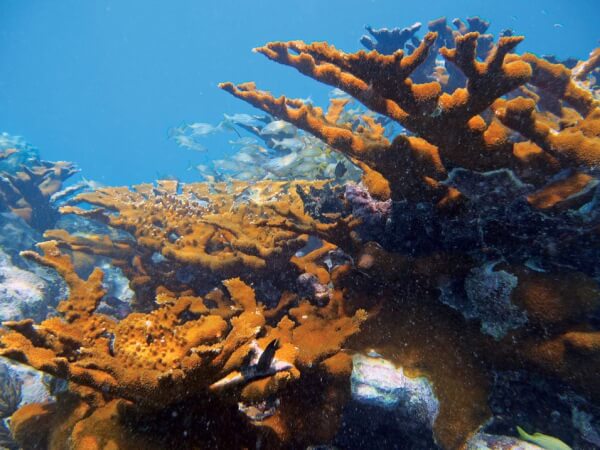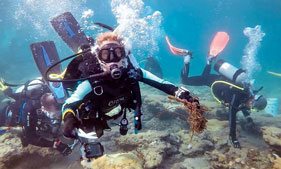
During the final two decades of the 20th century, scientists and educators flooded magazines and newspapers with news of coral reefs dying all over the world. By 2007, both federal and state governments responded with legislation including grants giving communities access to what they needed to “do something about the ocean.” And Floridians got busy. Meghan Balling, Fishing Diving and Other Uses Coordinator, oversees The Florida Department of Environmental Protection Planning Groups and Working Groups created through the Miami Based Coral Reef Conservation Program [CRCP].
Balling gathers boaters, divers, residents, sports people, marine related establishments, environmentalists and educators to engage with and respond to the silent plight of still dying sea creatures. One project, Southeast Florida Action Network [SEAFAN], enables everyone to report threats to fish or coral they see in their areas, using the SEAFAN online tool. The website provides easy fill-in blocks for reporting what, where and when for anyone spotting damage, illegal drainage, sick or dying reefs, trash accumulations or other potentially destructive activity.


Balling points to diver Lisa Miceli as representative of the contagious enthusiasm local divers bring into reef and ocean nurture. “Lisa,” Balling wrote, “started her own clothing line in order to raise money for cleanup supplies. She spearheads family oriented educational events and ocean clean-ups in her home town of Lauderdale-by-the-Sea and her Ocean Cleanup projects and online clothing company, Stoked on Salt [SOS] are dedicated to the cause.”
Miceli welcomes volunteers of all ages on the beach and pier cleanups to exchange buckets full of trash from the underwater workers for empty containers, and then sort and discard the trash into haul-away containers. According to her recruits, “It’s pretty hard to say no for very long to Lisa.”
Divers remove from the seabed or cut from pier posts and dispose of miles of fishing line, bushels of beer cans, buckets of lead items, miscellaneous plastic bags and drink holder rings, all lethal to sea dwellers. One diver, Lou Nelson, skeptical of the value of cleanups, but lured, he confesses, “by the promise of working with girls in bikinis,” found a gold wedding ring near the pier his first day with SOS volunteers. Pier management gave Miceli the ring-loser’s phone number and the ring was reunited with its very grateful owner in Canada.

Says Nelson, “I’m a scavenger. Our tools are knives, pliers and flashlights. The important work is where the garbage is. But sometimes we get lucky, too.” According to Miceli, “Nelson never misses one of my events. He says he is now forever Stoked on Salt.”
Then there’s SOS volunteer, spearfisherman Jim Pember. Corals are habitat for several of the game fish Pember enjoys. When he spears a grouper, he tries not to touch the reef at all, he said. The same is true when he’s doing cleanup. He finds “cutters usually do the job when removing fishing line from corals, although sometimes the corals grow around the lines. Still” he said, “99% of the time we can remove trash without harm to the corals.” Among his tools he carries “a CO2 bag for safely lifting an anchor and floating it from the reef to the surface to haul off for disposal.”
Last year, a SOS family day featured the cleanup of a beach turtle nursery area, helping tiny hatchlings to navigate more safely to their natural ocean home. This is what cleanup is about, say these volunteers. Coral lives, fish and turtle lives, plants…and ultimately people. “Volunteer Tony Ernst helps me with every event,” says Miceli. “He makes debris buckets, does marketing, handles prize giveaways, even brings his volunteer followers, about 50 – 60 divers, to my events to help out.”
“We all clean up wherever we dive,” Ernst said recalling he “once saved a shark totally engulfed in miles of monofilament line in a tangled roll as big as a tumbleweed. I carry cutters, and when I finished trimming away the mess and stowing it for disposal, the shark took off unhurt. In the end,” he said, “we are all so dependent on this planet’s oceans, we have to do something about their degrading at such a rate.”
The prizes Ernst gives away are made from debris collected at an event. Miceli creates awards for Most Unique Trash Gathered, Youngest Volunteer or whatever suits that particular event. Volunteers never know what feat or fact will make a celebrity out of someone, but the one-of-a-kind awards absolutely represent trash-to-treasure and are highly prized by the winners.

By the little hand-made trophies Miceli provides, volunteers can see “that you do not need money and fancy awards to make volunteering fun,” she says. The beach and ocean cleanups accomplished in these programs are, she declares, “a community project of love.”
Florida volunteers, recognizing the value of their ocean, demonstrate the effectiveness of learning what to do and then doing it. Together. They may, over time and with sustained effort, lead the way to the saving of world corals and sea life and the seas themselves in all their beauty and diversity.




